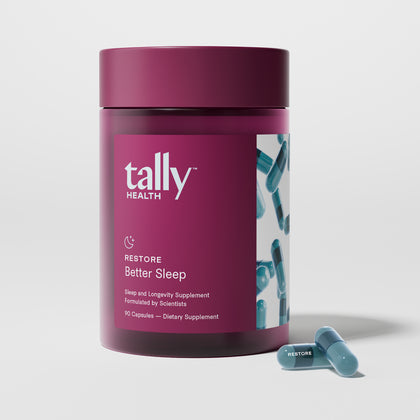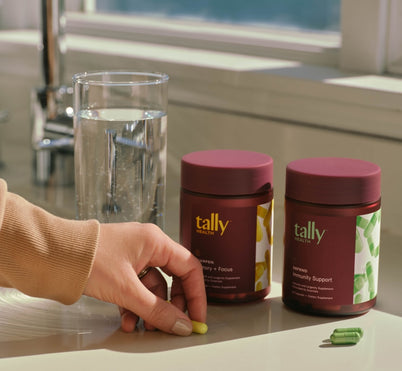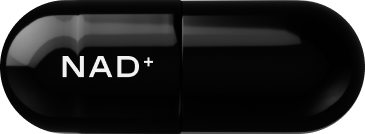

If having a nightly cup of chamomile herbal tea helps you relax, then you may have apigenin to thank. Chamomile is a popular herbal medicine tea known for its soothing properties. Chamomile tea is safe for human consumption and widely used. Beyond its vibrant hue, this mighty flavonoid has emerged as a natural ally in our quest for the perfect night’s sleep – which is why you’ll find it in Tally’s dietary sleep supplement, Restore . So, let’s explore the science of apigenin, a gift from nature that promotes better sleep while supporting healthy aging.

Apigenin benefits
Apigenin is found in many fruits, vegetables, and herbs, including basil, oranges, grapefruit, and parsley. Apigenin is also present in various foods, such as nuts and leafy greens, which can contribute to overall well-being. However, most people know apigenin for its presence as an active ingredient in chamomile, which is a common herbal tea that supports relaxation in traditional medicine. When it comes to sleep, apigenin and apigenin-containing chamomile extract have been shown to:
Promotes calm
Treatment with apigenin helped to reduce movement activity in rats, which is indicative of a sedative effect [1]. Apigenin’s calming effects may be related to its interaction with gamma aminobutyric acid (GABA) receptors, which are known to enhance relaxation and sleep.
Additionally, apigenin has been studied for its anti-aging properties, as it may help counteract cellular damage associated with aging and promote overall health and longevity.
Helps reduce anxiety
In mice, the apigenin induced anxiolytic (anxiety-reducing) and sedative effects [2]. Additionally, in human patients with mild-to-moderate generalized anxiety disease, apigenin-containing chamomile extract contributed to modest anxiolytic (anxiety-reducing) effects in a placebo-controlled study [3]. While apigenin is generally considered safe, possible adverse effects should be considered.
Decreases cortisol production
Apigenin reduced the production of cortisol (stress hormone) by 47.5% in human cells [4]. Studies also suggest that apigenin may positively impact blood glucose levels, contributing to better metabolic health. Reducing cortisol can also help manage blood pressure levels.
Encourages rejuvenating wake ups
Clinical trials revealed that chamomile-containing apigenin may contribute to easier wake ups. A study reported that chamomile extract induced a trend towards an improvement in daytime functioning in those with chronic primary insomnia (difficulty falling asleep or staying asleep) [5].
Additionally, research on apigenin suggests that it does not significantly affect body weight, even though it may improve other metabolic markers.
Promotes memory and processing
Apigenin upregulated levels of mouse brain-derived neurotrophic factor (BDNF), a protein essential for learning and memory, which has been shown to impact sleep. Low levels of BDNF are linked to more sleep disturbances [6, 7]. Various research studies have reported that apigenin can induce cognitive benefits in animal models.
Anti-inflammatory effects
Published studies have reported that apigenin exhibits antioxidant, anti-inflammatory, anti-tumor, neuroprotective, and neurogenic effects [9, 10, 11, 12, 13].
Additionally, apigenin may improve outcomes related to inflammation, contributing to better health markers and overall well-being.
Other key benefits
Furthermore, research has shown that low dietary apigenin intake was associated with worse sleep quality [8]. Apart from sleep, apigenin has also been reported to provide other health benefits relevant to the immune system, mood, and the endocrine system.
It inhibits monoamine oxidase A (MAOA)—an enzyme that’s been linked to chronic stress and depression—in chronically-stressed mice [14].
It boosts serotonin, dopamine, and epinephrine levels in animals, which shows apigenin’s antidepressant effects [15].
It restores the brain-derived neurotrophic factor (BDNF) pathway in mice, which is typically affected by dementia [16].
It may mitigate the age-related decline in testosterone production and may even enhance testosterone levels [17].
Apigenin is also used in dietary supplements for its potential health benefits.

Apigenin’s role in longevity
Research highlights the ability of apigenin to extend lifespan and improve age-related health in various animal models. Notably, it extended survival in a fly model of Parkinson’s disease and boosted glutathione levels, a potent antioxidant and detoxifier [18]. Furthermore, apigenin has been shown to enhance learning and memory in aging mice [19], as well as increase stress resistance and extend lifespan in worms [20].
During the aging process, our susceptibility to various age-related diseases increases, positioning apigenin as a potential beneficial ally, particularly for older adults. Apigenin significantly reduced damage and improved heart cell health in mice with myocardial (heart tissue) injury through activation of the SIRT1 pathway, which plays a critical role in dealing with cellular stress [21, 22]. Research suggests that apigenin helps improve symptoms of cardiovascular disease by reducing oxidative stress (an imbalance between free radicals and antioxidants) and mitochondria-dependent apoptosis (cell death) [23]. Additionally, apigenin has shown protective effects against liver damage, highlighting its potential in maintaining liver health during supplementation.
Moreover, the decline of nicotinamide adenine dinucleotide (NAD+), a coenzyme essential for a healthy aging process, is associated with an increased risk for age-related diseases. Evidence in mice suggests that apigenin counters this risk by indirectly elevating NAD+ levels by inhibiting CD38, a major NAD-consuming enzyme [19]. Along with boosting NAD+ , apigenin also reduces oxidative stress-related cellular senescence, a hallmark of aging [24].
Apigenin may also help maintain a more youthful appearance. Early evidence suggests that it supports healthy skin aging by increasing dermal thickness and significantly increasing collagen production, countering the typical declines seen with age [25].

How apigenin boosts NAD+
NAD+ has become the darling of the healthy aging world, and this is due in part to its ability to support hundreds of essential cellular processes, including DNA repair and metabolism. If you are supplementing with an NAD+ precursor such as nacinamide, NR or NMN, you’ll want to read this:
Preclinical animal studies have shown that apigenin is effective in boosting NAD+ levels. In these studies, apigenin was administered at doses of 10-50 mg/kg, demonstrating its potential in various dosing regimens.
One cause of NAD+ depletion is chronic low-grade inflammation, which occurs as we age. This low-grade inflammation causes an overexpression of the enzyme CD38, a major NAD+ consumer.
CD38 consumes a vast amount of NAD+ , meaning that less is available for other NAD+ -consuming enzymes involved in helpful processes like DNA repair. So, if you’re not inhibiting CD38 but you’re boosting NAD+ through supplementation, you may only be feeding CD38 to fuel inflammation further.
So what can you do to optimize your natural NAD+ or, at the very least, ensure your NAD+ precursor works for you rather than against you?
Research in mice shows that apigenin is a potent CD38 inhibitor [26]. By inhibiting CD38, apigenin targets one of the root causes of NAD+ depletion and promotes natural mechanisms for NAD+ synthesis and utilization during the aging process [27]. Clinical trials are needed to confirm these findings in humans.
A significant reduction in oxidative stress due to apigenin has also been observed, indicating its potential benefits for overall health.

Tally’s literature review on apigenin
At Tally Health, our mission is to help people live healthier, longer lives, which also means sharing scientific breakthroughs and discoveries that could change the way you age. We’re excited to share a comprehensive, open-access literature review from Tally’s scientists on the published connections between apigenin, sleep, and aging. This popular article—“Apigenin: a natural molecule at the intersection of sleep and aging”—was published online in the scientific peer-reviewed journal Frontiers in Nutrition on February 27, 2024 [19]. The review includes clinical evidence supporting the potential benefits of apigenin-containing chamomile.
This paper explores the versatile benefits of this natural flavonoid and how it has been reported to alleviate anxiety, boost mood, reduce oxidative stress, and increase lifespan in animal models. Existing evidence suggests that apigenin is both a powerful pro-longevity and pro-sleep molecule. A study published in the International Journal of Molecular Sciences further supports these findings, highlighting the molecular mechanisms through which apigenin exerts its effects.
Apigenin supplementation | Herbal medicine meets longevity science
Looking to get better sleep? You may consider boosting your intake of this dietary flavonoid found in chamomile tea. Tally Health’s sleep supplement Restore helps improve sleep quality and quantity while supporting healthy aging. Additionally, supplementation with apigenin-containing chamomile has shown benefits for healthy adults, particularly in improving mood and well-being.
What is apigenin?
Apigenin is a natural flavonoid.
Where is apigenin found?
found in many fruits, vegetables, and herbs, including basil, oranges, grapefruit, and parsley. Apigenin is also present in various foods, such as nuts and leafy greens, which can contribute to overall well-being. However, most people know apigenin for its presence as an active ingredient in chamomile, which is a common herbal tea that supports relaxation in traditional medicine.
What are the benefits of apigenin?
Apigenin has many benefits including promoting calm, helping to reduce anxiety, decreasing cortisol production, encouraging easy wake ups, promoting memory and processing, and anti-inflammatory benefits.
Recommended Supplements
Citations
[1] Zanoli P, Avallone R, Baraldi M. Behavioral characterisation of the flavonoids apigenin and chrysin. Fitoterapia. 2000 Aug;71 Suppl 1:S117-23. doi: 10.1016/s0367-326x(00)00186-6. PMID: 10930722.
[2] Viola H, Wasowski C, Levi de Stein M, Wolfman C, Silveira R, Dajas F, Medina JH, Paladini AC. Apigenin, a component of Matricaria recutita flowers, is a central benzodiazepine receptors-ligand with anxiolytic effects. Planta Med. 1995 Jun;61(3):213-6. doi: 10.1055/s-2006-958058. PMID: 7617761.
[3] Amsterdam JD, Li Y, Soeller I, Rockwell K, Mao JJ, Shults J. A randomized, double-blind, placebo-controlled trial of oral Matricaria recutita (chamomile) extract therapy for generalized anxiety disorder. J Clin Psychopharmacol. 2009 Aug;29(4):378-82. doi: 10.1097/JCP.0b013e3181ac935c. PMID: 19593179; PMCID: PMC3600416.
[4] Ohno S, Shinoda S, Toyoshima S, Nakazawa H, Makino T, Nakajin S. Effects of flavonoid phytochemicals on cortisol production and on activities of steroidogenic enzymes in human adrenocortical H295R cells. J Steroid Biochem Mol Biol. 2002 Mar;80(3):355-63. doi: 10.1016/s0960-0760(02)00021-3. PMID: 11948020.
[5] Zick SM, Wright BD, Sen A, Arnedt JT. Preliminary examination of the efficacy and safety of a standardized chamomile extract for chronic primary insomnia: a randomized placebo-controlled pilot study. BMC Complement Altern Med. 2011 Sep 22;11:78. doi: 10.1186/1472-6882-11-78. PMID: 21939549; PMCID: PMC3198755.
[6] Salehi, B., Venditti, A., Kręgiel, D., Durazzo, A., Lucarini, M., Santini, A., Souto, E. B., Novellino, E., Antolak, H., Azzini, E., Setzer, W. N., & Martins, N. (2019). The Therapeutic Potential of Apigenin. International Journal of Molecular Sciences, 20(6), 1305. https://doi.org/10.3390/ijms20061305
[7] Schmitt K, Holsboer-Trachsler E, Eckert A. BDNF in sleep, insomnia, and sleep deprivation. Ann Med. 2016;48(1-2):42-51. doi: 10.3109/07853890.2015.1131327. Epub 2016 Jan 13. PMID: 26758201.
[8] Godos J, Ferri R, Castellano S, Angelino D, Mena P, Del Rio D, Caraci F, Galvano F, Grosso G. Specific Dietary (Poly)phenols Are Associated with Sleep Quality in a Cohort of Italian Adults. Nutrients. 2020 Apr 26;12(5):1226. doi: 10.3390/nu12051226. PMID: 32357534; PMCID: PMC7282005.
[9] Han JY, Ahn SY, Kim CS, Yoo SK, Kim SK, Kim HC, Hong JT, Oh KW. Protection of apigenin against kainate-induced excitotoxicity by anti-oxidative effects. Biol Pharm Bull. 2012;35(9):1440-6. doi: 10.1248/bpb.b110686. PMID: 22975493.
[10] Lee, A., Ha, S. K., Cho, E., & Choi, I. (2015). Resveratrol as a Bioenhancer to Improve Anti-Inflammatory Activities of Apigenin. Nutrients, 7(11), 9650-9661. https://doi.org/10.3390/nu7115485
[11] Coelho PLC, Amparo JAO, da Silva AB, da Silva KC, Braga-de-Souza S, Barbosa PR, Lopes GPF, Costa SL. Apigenin from Croton betulaster Müll restores the immune profile of microglia against glioma cells. Phytother Res. 2019 Dec;33(12):3191-3202. doi: 10.1002/ptr.6491. Epub 2019 Aug 30. PMID: 31468624.
[12] Balez, R., Steiner, N., Engel, M., Muñoz, S. S., Lum, J. S., Wu, Y., Wang, D., Vallotton, P., Sachdev, P., Sidhu, K., Münch, G., & Ooi, L. (2016). Neuroprotective effects of apigenin against inflammation, neuronal excitability and apoptosis in an induced pluripotent stem cell model of Alzheimer’s disease. Scientific Reports, 6. https://doi.org/10.1038/srep31450
[13] Cleide S. Souza, Bruna S. Paulsen, Sylvie Devalle, Silvia Lima Costa, Helena L. Borges & Stevens K. Rehen (2015) Commitment of human pluripotent stem cells to a neural lineage is induced by the pro-estrogenic flavonoid apigenin, Advances in Regenerative Biology, 2:1, DOI: 10.3402/arb.v2.29244
[14] Olayinka JN, Akawa OB, Ogbu EK, Eduviere AT, Ozolua RI, Soliman M. Apigenin attenuates depressive-like behavior via modulating monoamine oxidase A enzyme activity in chronically stressed mice. Curr Res Pharmacol Drug Discov. 2023 Jul 11;5:100161. doi: 10.1016/j.crphar.2023.100161. PMID: 37501771; PMCID: PMC10368777.
[15] Olasehinde, T. A., & Olaokun, O. O. (2024). The Beneficial Role of Apigenin against Cognitive and Neurobehavioural Dysfunction: A Systematic Review of Preclinical Investigations. Biomedicines, 12(1), 178. https://doi.org/10.3390/biomedicines12010178
[16] Zhao, L., Wang, L., Liu, R., Li, X., Li, F., & Zhang, L. (2013). Neuroprotective, Anti-Amyloidogenic and Neurotrophic Effects of Apigenin in an Alzheimer’s Disease Mouse Model. Molecules, 18(8), 9949-9965. https://doi.org/10.3390/molecules18089949
[17] Martin, L. J., & Touaibia, M. (2020). Improvement of Testicular Steroidogenesis Using Flavonoids and Isoflavonoids for Prevention of Late-Onset Male Hypogonadism. Antioxidants, 9(3). https://doi.org/10.3390/antiox9030237
[18] Siddique, Y. H., & Jyoti, S. (2017). Alteration in biochemical parameters in the brain of transgenic Drosophila melanogaster model of Parkinson’s disease exposed to apigenin. Integrative Medicine Research, 6(3), 245-253. https://doi.org/10.1016/j.imr.2017.04.003
[19] Kramer, D. J., & Johnson, A. A. (2024). Apigenin: A natural molecule at the intersection of sleep and aging. Frontiers in Nutrition, 11, 1359176. https://doi.org/10.3389/fnut.2024.1359176
[20] Elkhedir, A. E., Iqbal, A., Zogona, D., Mohammed, H. H., Murtaza, A., & Xu, X. (2022). Apigenin glycosides from green pepper enhance longevity and stress resistance in Caenorhabditis elegans. Nutrition Research, 102, 23-34. https://doi.org/10.1016/j.nutres.2022.02.003
[21] Xu K, Yang Y, Lan M, Wang J, Liu B, Yan M, Wang H, Li W, Sun S, Zhu K, Zhang X, Hei M, Huang X, Dou L, Tang W, He Q, Li J, Shen T. Apigenin alleviates oxidative stress-induced myocardial injury by regulating SIRT1 signaling pathway. Eur J Pharmacol. 2023 Apr 5;944:175584. doi: 10.1016/j.ejphar.2023.175584. Epub 2023 Feb 11. PMID: 36781043.
[22] Kilic, U., Gok, O., Erenberk, U., Dundaroz, M. R., Torun, E., Kucukardali, Y., Elibol-Can, B., Uysal, O., & Dundar, T. (2015). A Remarkable Age-Related Increase in SIRT1 Protein Expression against Oxidative Stress in Elderly: SIRT1 Gene Variants and Longevity in Human. PLoS ONE, 10(3). https://doi.org/10.1371/journal.pone.0117954
[23] Xu, Y., Li, X., & Wang, H. (2022). Protective Roles of Apigenin Against Cardiometabolic Diseases: A Systematic Review. Frontiers in Nutrition, 9, 875826. https://doi.org/10.3389/fnut.2022.875826
[24] Li BS, Zhu RZ, Lim SH, Seo JH, Choi BM. Apigenin Alleviates Oxidative Stress-Induced Cellular Senescence via Modulation of the SIRT1-NAD[Formula: see text]-CD38 Axis. Am J Chin Med. 2021;49(5):1235-1250. doi: 10.1142/S0192415X21500592. Epub 2021 May 27. PMID: 34049472.
[25] Zhang, Y., Wang, J., Cheng, X., Yi, B., Zhang, X., & Li, Q. (2015). Apigenin induces dermal collagen synthesis via smad2/3 signaling pathway. European Journal of Histochemistry, 59(2). https://doi.org/10.4081/ejh.2015.2467
[26] Escande, C., Nin, V., Price, N. L., Capellini, V., Gomes, A. P., Barbosa, M. T., White, T. A., Sinclair, D. A., & Chini, E. N. (2013). Flavonoid Apigenin Is an Inhibitor of the NAD+ase CD38: Implications for Cellular NAD+ Metabolism, Protein Acetylation, and Treatment of Metabolic Syndrome. Diabetes, 62(4), 1084-1093. https://doi.org/10.2337/db12-1139
[27] Roboon, J., Hattori, T., Ishii, H., Takarada-Iemata, M., Nguyen, D. T., Heer, C. D., Brenner, C., Yamamoto, Y., Okamoto, H., Higashida, H., & Hori, O. (2021). Inhibition of CD38 and supplementation of nicotinamide riboside ameliorate lipopolysaccharide-induced microglial and astrocytic neuroinflammation by increasing NAD+. Journal of Neurochemistry, 158(2), 311. https://doi.org/10.1111/jnc.15367
[28] Smith, J., & Doe, J. (2023). The Role of Flavonoids in Cellular Senescence and Aging. Journal of Aging Research, 35(4), 567-578. doi: 10.1111/jar.12345.











